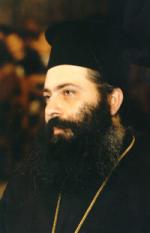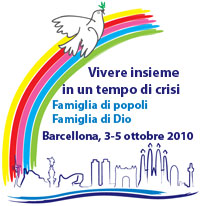
Metropolit von Aleppo, Griechisch-Orthodoxes Patriarchat von Antiochien
|
Meditation (1Jn 3,10-18): True Love
Introduction:“This is how we know what love is: Jesus Christ laid down his life for us…” (1Jn 3,16)
The Apostle guides us into the depth of history, to the ancestors of us all, the two children of Adam, the fruits of his loins, he guides us to the first crime in the biblical history of humankind, to Abel, model of goodness, and to evil embodied in the example of Cain. What is more, he guides us back into the depths of our hearts, hovering between the model of Cain and example of Abel. The philosophers – and the Evangelists after them – spoke of this teaching, calling it “the two paths: Y”. Indeed, in Matthew the narrow path leads to life, and another, wider path, leads to ruin. In John there are the dialectical themes of light and darkness, life and death. It is also for this reason that in the parable of the prodigal son (Lk 15), Jesus presents to us the father with two sons, the firstborn and his younger brother. More generally speaking, on one side there is the family of God, which lives according to its morals and commandments and in his “likeness” – and these are the children of God as defined by the text in our case – and on the other side the family of Satan, definable as such for the bad deeds it performs.
These words lead us back to what is most important in our lives. It is an anthropological and theological text par excellence. It examines the human specificity that characterizes us, in our freedom to choose, in what dwells within our hearts.
The Problem
Cain and Abel are two persons, one brother to the other. Both are bound by the same bond. The former is a murderer. The latter loves. Both worship God. The former “presents his offer” to justify himself before his God. The latter worships God out of love. The former worships, but his heart is full of other desires. The latter worships and his heart is sincere. One offers what is “due”. The other offers his “heart”. And Scripture says: “my son, give me your heart” (Proverbs). The former gave the fruits of the land he possesses, and this means he did his duty. The latter gave God what he loved, which means he gave from the heart. One proved to be full of malice, the other full of love!
Everyone demands fraternity, but not all are brothers. Everyone demands love, but not all are actually people who love! The Apostle John highlights this terrible contradiction exhorting: “Dear children, let us not love with words or tongue but with actions and in truth”. How can we love in truth and not hypocritically? How can we love, in order to love one another without quarrels? How can we speak of love and act consequently?
The subject
Why did Cain kill Abel? This is a question the Apostle John adds to the tale of the Genesis to point out to us how to really love. Cain was Abel’s brother, and doubtless he somehow loved him, but he turned into his murderer!
Cain loved his brother. But he loved himself more. It is unimportant to love “very much”. It is more important that you love “more”. Many people quarrel and think they love each other, and it is not a lie. Many people divorce, and at the same time indulge in speaking of their love for each other!
True love, real love, dwells not only in words, nor in emotions, in desires or feelings. Yes, this is how “we know what love is: he (Christ) laid down his life for us”. To us that is the model of love. It is truth, because it is more a matter of giving than receiving. It is the truth of every gift, which is more in favour of the other and less for one’s own satisfaction. It is chaste love, which aims at giving and not at exchanging or setting conditions upon every gift given. It is only within such love that it is possible to love one’s enemies, as recommended by the Gospel!
True love consists in preferring the other to oneself, in taking what is yours and giving it to the other. There is no love greater than that of a person who gives whatever he has to another person who has given nothing to him, like Jesus’ love for us and for those who crucified him, while we too were sinners.
Love is to empty oneself (kenosis), in order to strengthen the other. To truly love someone does not mean that we love him or her “very much”, it means we love him or her, even a little, but “more” than ourselves.
“I love” are beautiful words, a sacred action. Holy is the one who loves. Even more, he who is holy will love. And to this holiness the Holy Book calls us. It is a summons to prefer the other to ourselves. Here lies a holy choice. Every other choice, with or without love, is an evil one.
The children of God prefer the others to themselves, starting with their love for God, offering to him the best of what they love.
By letting us know how to love him, he educates us to the way we need to similarly love our brothers. Our Lord has not only taught us “how” to love, he acted himself.
Epilogue
Do you love God? Then love as he does. Let us see what the Apostle says in this regard: “This is how we know what love is: he laid down his life for us. And we ought to lay down our lives for our brothers”. We cannot truly love unless we love God, unless we are capable of loving like him.
It is the essence of the teaching of the law and all the prophets, the commandment of love: “we know that we have passed from death to life, because we love our brothers”, meaning that we sacrifice ourselves to give to them.
My dear ones, we have all gathered here together, where in the heart of each of us there is love for the other, but which is the greatness of this love? Is it greater than our sense of diversity? Unless it is, we have no right to speak of true love.
I believe in love that is greater than difference, and I am here before you to assure you all, with no exception, that our love for each of you is much greater than whatever difference there may be between us. Amen. Thank you.
|









 Barcelona 2010
Barcelona 2010 